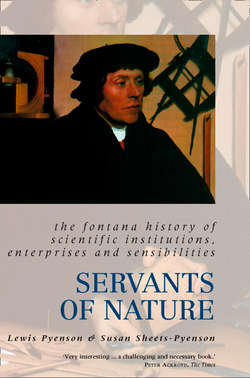Читать книгу Servants of Nature: A History of Scientific Institutions, Enterprises and Sensibilities - Lewis Pyenson - Страница 6
PREFACE
ОглавлениеScience, Ernest Gellner has contended, is the mode of cognition of Western industrial society. These words beat a ragged, fading tattoo across the twentieth century. The music asks: why do we seek to know? What is science? Who sees with Western eyes? The pipers form a splendid procession. But will it last? Will we continue to think scientifically? Or does the spectacle mark the end of an epoch? In view of its past, does science have a future?
A reader may ask how science can disappear. With all our modern contrivances and information, how – short of an environment-wrenching catastrophe – could science come to an end? Yet the circumstance has occurred before, when past civilizations like Rome and China expressed little interest in seeking explanations for natural phenomena. They delighted in mechanical contrivances; they celebrated canonical wisdom; they published enduring works of art and literature. But they were not driven to push back the frontiers of knowledge, to use a metaphor associated with European expansion.
The present book has emerged as an enquiry into science as a social activity. It relates directly to the prospect of science in our time. We do not proceed by appealing to the heavy theoretical machinery and the long-distance sentences that are now fashionable in our discipline. We fly no philosophical, political, or methodological colours. We celebrate the observation attributed to writer Marcel Proust, that methodology, when visible in writing, is like a price tag worn on a suit of clothes. We are mindful of poet John Keats’s sentence about rejecting poetry that has a design on us.
As we enter a new millennium, the words of Francis Bacon possess a freshness and special pertinence. To invoke his phrase ‘servants of nature’ is to offer relief from those who would exaggerate or minimise the interpretation of science broadly conceived. This phrase balances the self-satisfaction, if not the hubris, of some scientists with Bacon’s recognition that nature, to be commanded, must be obeyed. Bacon knew that evidence from the natural world comes in many forms; evidence, in some manner going beyond prejudice, can produce general judgments and, on occasion, laws.
Our method will be apparent from the Table of Contents. We identify and elaborate a number of themes that we believe are central to exploring the role of science in society. The themes fall under three headings: institutions, enterprises, and sensibilities. We trace the themes through the recent and more distant past, through Western and non-Western cultures. Our work is grounded in the belief that history may help us see clearly today. We draw inspiration from the great works of French scholarship that celebrate history as a craft based upon a manipulation of concrete particulars, a tradition inaugurated by Marc Bloch and perfected by Theodore Zeldin.
This book is in fact a child of French North America. Conceived in French Canada, where we taught at Université de Montréal and Concordia University, it finally emerged in French Acadiana, where we work at the University of Southwestern Louisiana. While writing it we ran up many debts. We wish to thank our students and colleagues, who heard us elaborate these ideas. We owe special thanks to Eliane Kinsley and Marc Speyer-Ofenberg, and we are grateful to Roy Porter, Crosby Smith, and Bill Swainson for critical comments. Anyone who has lived through a marital collaboration knows what is involved, but children are the most perceptive observers of it. We dedicate this book to our three spirits.
Lafayette, Louisiana
May Day 1996
